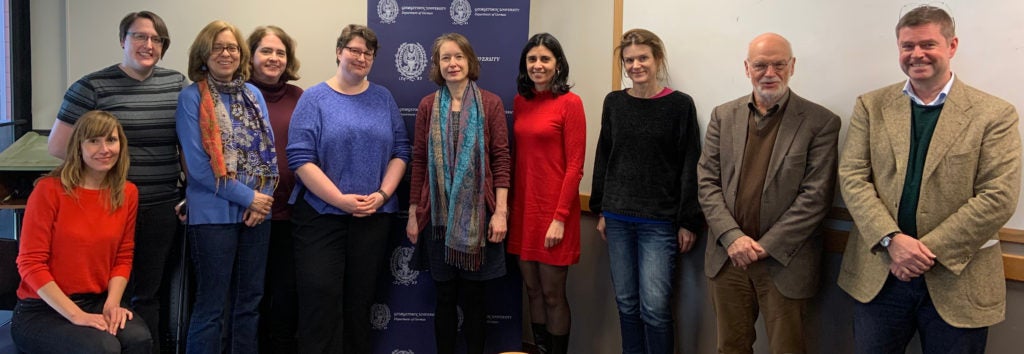German Poetry and the Challenges of the Anthropocene
The German Department hosted two events co-sponsored by the DFG-2603 Center for Advanced Studies in the Humanities FOR 2603, “Poetry in Transition,” at the University of Trier.
The first, on February 27, featured a lecture with Dr. Matthias Fechner of the University of Trier titled Diskrepanzen der Grünen: eine Partei zwischen Programmatik, Realpolitik und Projektion.
Since the turn of the millenium, the Green Party has enjoyed a remarkable period of success in Germany. In a number of states (e.g., Baden-Wuerttemberg, Hesse, Rhineland-Palatinate), Green ministers participate in coalition governments. On the federal level, the Green Party has not only shared power in the Schroeder cabinets, but has dominated the political agenda, decisively influencing several progressive policy changes around issues such as nuclear power, immigration, ecological farming, and gender equality.
More recently, however, the party’s political stance has become somewhat more ambiguous, as evidenced for example by the benign paternalism of Baden-Württemberg state minister Winfried Kretschmann; the anti-immigration stance of the Green mayor of Tübingen, Boris Palmer; or the “green consumerism” of the trendy Prenzlauer Berg neighborhood of Berlin. In this talk, Professor Matthias Fechner of the University of Trier analyzed the German Green Party’s ambiguous political stance, not only by examining contemporary policies and policy-making processes but also by scrutinizing the fascinating roots of the alternative movement in Germany, reaching as far back as the early 19th century.
A roundtable panel on German Poetry and the Challenges of the Anthropocene was held on Friday, February 28. In this roundtable, literature professors from the University of Trier explored responses to the Anthropocene in a selection of contemporary texts including Daniela Seel’s voluminous anthology “Lyrik im Anthropozän” (2016) as well as poems by Sabine Scho, Birgit Kreipe, Durs Grünbein and Christian Lehnert. A selection of poems (in the original German) and project descriptions will be circulated prior to the event. The roundtable concluded with a presentation of the Internationale Zeitschrift für Kulturkomparatistik (International Journal for Comparative Cultural Studies), published by the University of Trier since 2019.

About the presenters: A postdoctoral researcher at the Research Initiative Rheinland-Pfalz and a former school principal, Matthias Fechner (Trier) is an associate of the DFG-Center for Advanced Studies in the Humanities FOR 2603, “Poetry in Transition,” at the University of Trier. He holds degrees from the University of Sheffield and the University of Stuttgart. His research is concentrated on contemporary poetry, politics, and the history of education. Friederike Reents (Heidelberg/Trier) studied German literature and philosophy at the University of Heidelberg. Since 2013, she has been a teaching professor at Heidelberg. She is currently director of young researchers in the DFG Center “Poetry in Transition” (since 2018); she also held a research fellowship at Harvard University in 2019. Her research focuses on modern and contemporary literature, aesthetics and poetics, and environmental humanities. Rainer Grübel (Oldenburg) is professor emeritus of Slavic literatures at the University of Oldenburg (Germany). He studied Slavic literatures, German literature and philosophy in Göttingen, Frankfurt, and St. Petersburg, and also taught as full professor in Utrecht and Leiden. His main fields of interest are Russian and German literature and philosophy, theory and axiology of literature, and modern Russian and German poetry. Henrieke Stahl (Trier), Professor for Slavic Literatures at the University of Trier, is the director of the DFG-Center, “Poetry in Transition.” She has degrees from the universities of Trier and Münster. Her interests are concentrated on Russian and Polish literature, Russian and European philosophy, and comparative literature.